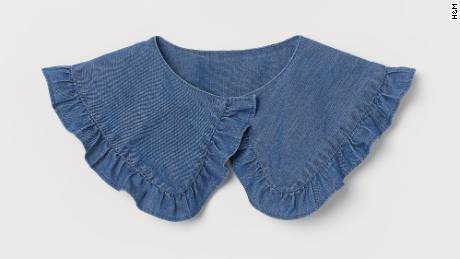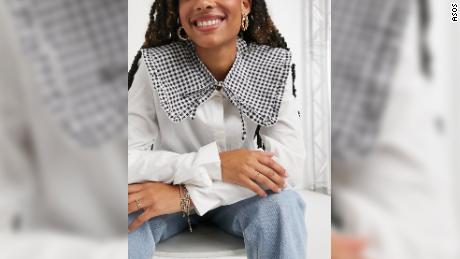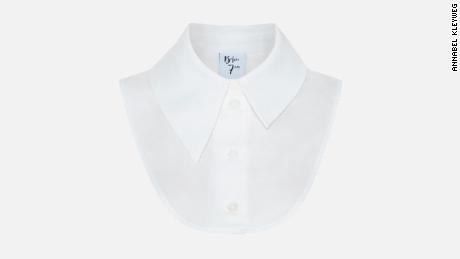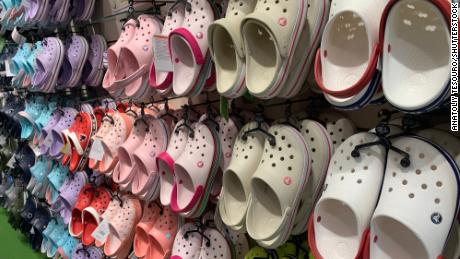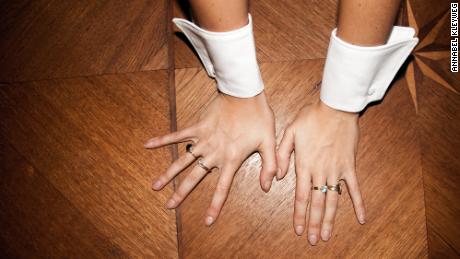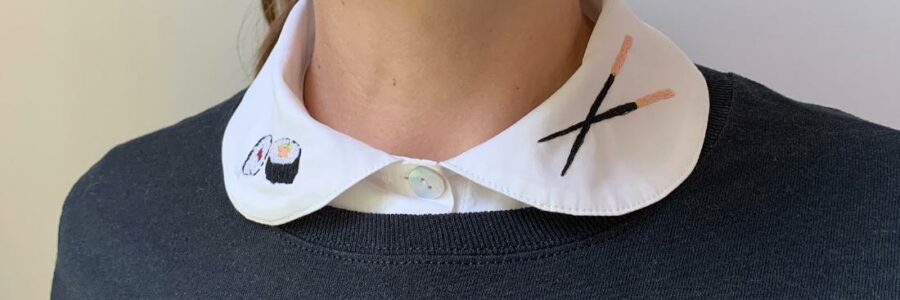
H&M is bringing faux collars into its stores this spring.
New York (CNN)A styling hack that converts even the dowdiest of t-shirts into a Zoom-ready look is gaining steam.
It’s called the “faux collar,” a detachable collar that you pop around your neck over a shirt or sweater to give it some oomph, just in time for that video call. Retailers like H&M and Macy’s are ready to take it mainstream as they try to capitalize on America’s penchant for comfort–and easy wardrobe solutions– in the work-from-home era.
It comes at a time when major chains are struggling to convince people to shop. Sales at clothing and clothing accessories stores tumbled 26.4% in 2020 versus the prior year, according to the Commerce Department.
While it’s no silver bullet, on-trend products like faux collars could help retailers generate some incremental sales.
“Faux collars are an emerging trend as we push ourselves to showcase our individuality in front of the screen,” said Dayna Isom Johnson, resident trend expert with Etsy (ETSY). “Some collars are embellished with intricate details, floral patterns or beads. It’s a really easy way to add glamor.”
Fast fashion seller H&M said it is bringing faux collars to its stores in the coming weeks featuring frilly edges and eyeleted options and says it will sell more variations in the spring, Maria Östblom, head of womenswear design for H&M, said in an email.
Macy’s (M)will have an assortment of detachable oversized collars on sweaters and t-shirts in the spring. In the fall it will also launch standalone versions of collars with lace, ruffles, eyelet designs, and jeweled embellishments.
“[It] perfectly reflects this era of above the keyboard style,” Durand Guion, vice president of Macy’s Fashion, said in an email to CNN Business.
Online fashion seller ASOS started selling fake collars last summer. On the low-end, ASOS has a frill detachable collar in gingham priced at $9.50. It’s selling another dressier black oversized faux collar with frills for $17.50.
ASOS said sales have been strong and that it is adding more styles and colors to its offering.
“They’re both a sustainable and affordable way to change up an outfit and update the look, promoting more longevity in items we already own,” the retailer said in a statement.
What’s old is new again
Faux collars aren’t a brand new sartorial invention, said Jessica Cadmus, a New York-based stylist and personal shopper.
“Women were wearing detachable collars as far back as the 1930s,” she said. The vintage collars then were ornate, made with fur, lace and beads.
And there was a utilitarian value in the detachable collar, especially for menswear in the 1850s. “You didn’t have to wash the body of the shirt as often. You could simply detach and scruff both the collar and the cuffs,” she said.
Vogue noted the comeback of the faux collar on couture runway shows in 2020.
“We saw a few removable collars in the fall 2020 collections, from brands like JW Anderson and Ganni. However, colorful gingham versions from a smaller brand called La Veste have popped up on my Instagram feeds as of late,” said Madeline Fass, Vogue’s fashion market editor.
There are more signs the collar is gaining traction beyond the runway. As a category, overall searches for detachable, removable or faux collars on Etsy have surged 96% just in the last three months compared to the same period a year earlier, said Isom Johnson.
Annabel Kleyweg has been selling handcrafted faux collars on her Etsy shop Before7am since 2017. Her designs favor ’70s inspired rounded-and-pointed collars, Tuxedo styles, and the occasional quirky asymmetrical collar.
She used to describe the collars as niche products for a niche market but now expects them to go mainstream.
Since September, Kleyweg said she’s noticed demand rev up for faux collars, so much so that her revenue had increased three-fold since 2019. “I’m even getting interest from retailers,” she said.
Source: Read Full Article
